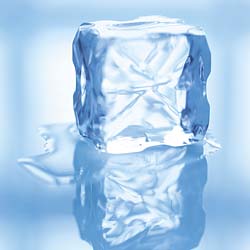
The Japan Agency for Marine-Earth Science and Technology (JAMSTEC) and the Japan Aerospace Exploration Agency (JAXA) cooperatively analyzed oceanic and atmospheric observation data and sea ice data acquired by satellites, and found that the sea ice area in the Arctic Ocean has been decreasing at a much faster pace than expected compared to the previous worst record in the summer of 2005. After satellite observations started in 1978, the observed area shrunk to its lowest level on August 15, 2007. Ice melting normally continues until mid September, thus further shrinkage of the sea ice area is expected. The observed phenomenon significantly exceeded the forecasted model submitted in the Intergovernmental Panel on Climate Change (IPCC) fourth Assessment Report, and the big difference tells us that the model may not precisely reflect the actual situation in the Arctic Ocean.
The following are findings as a result of analysis of observation data acquired by the Advanced Microwave Scanning Radiometer (AMSR-E). The AMSR-E acquires observation data and visible images of sea ice density.
1. Since July, the smallest record of sea ice area in the Arctic Ocean has been broken every day.
2. Since the beginning of August, the shrinkage of sea ice has been accelerated by a low pressure system generated and lingering off Siberia.
3. On August 15, the total sea ice area in the Arctic Ocean reached a new low.
4. If this pace of melting continues, the sea ice area reduction pace may significantly exceed the IPCC forecast, and it may actually reach the forecasted values for 2040 to 2050.
This picture shows Sept. 22 2005 the previous worst ice cover ever recorded.
This picture shows Sept. 16 2006
On August 15, 2007, the area got smaller than the worst record marked in September 2005.
The receding of sea ice is especially noticeable toward the North Pole in North American Coastal areas and the Northern ocean area of East Siberia.
The following are estimated causes of accelerated sea ice reduction this year as a result of the comprehensive analysis of the observation data acquired by JAMSTEC including observation data by ships, continued observation by drifting buoys (JCAD, POPS*2) and atmospherics data.
1. Sea ice reduction has been observed not only along the coast of Alaska but also along the Arctic Ocean shore of Canada this year. Accordingly, the impact of friction from coastal areas is smaller than usual thus sea ice tends to move in a large scale. This fragile and easy-to-melt ice, that has just formed in coastal areas, spreads into the Arctic Ocean.
2. As this fragile ice moves into the Arctic Ocean it melts quickly and the ocean water is able to absorb more sunshine, warming the water and further accelerating the melting.
3. More sea ice has been drifting toward the Atlantic Ocean from the Arctic Ocean, decreasing the volume of sea ice in the Arctic Ocean.
A graph showing the change in the sea ice area in the Arctic Ocean between 2002 and 2007. Until this June, the area change trend was about the same as previous years, but since July, each day sets a new low record. On August 15, the previous worst record marked in Sept. 2005 was broken more than one month earlier. The shrinking area is expected to continue, and new records are expected. If you are into this sort of thing you can find the most up to date image of the shrinking arctic ice here.
So what does this all mean?
A: The IPCC report has erred on the side of caution, by a lot.
B: It seems we simply don’t understand just how fast these feedback loops are going to warm the temperature of the Arctic.
C: We almost surly have less time than we had assumed to make strong changes to the way we live our lives.
It is not just polar bears that will be effected by an ice free arctic, although they most certainly will. All that fresh water could disrupt global sea currents that rely on cold salty water to flow, which could in turn effect weather all over the planet (and not in a good way).
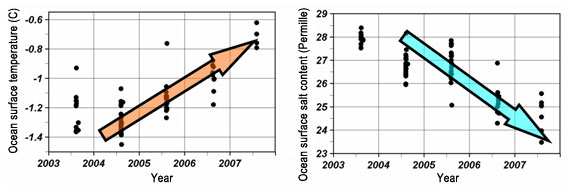
Call, email, phone your senator and representative and badger them about this, send them links to these sites, and let them know we want action now to reduce green house gases, that we want renewable energy, and that we want it now.
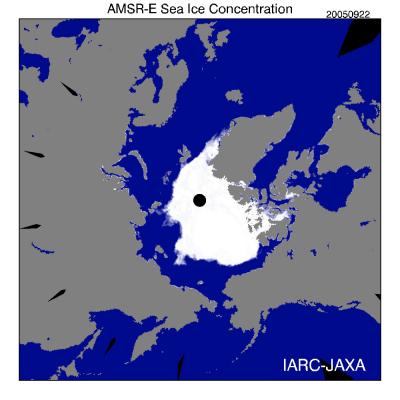
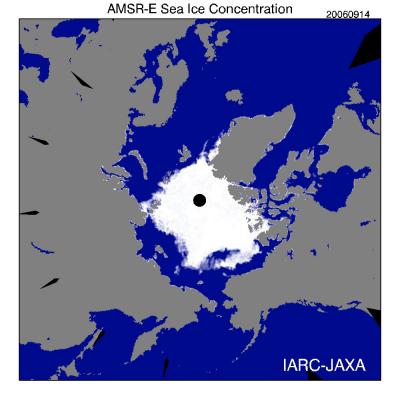
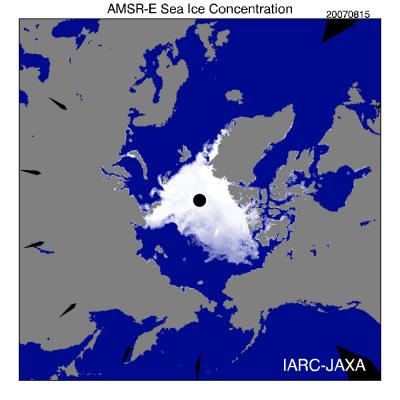
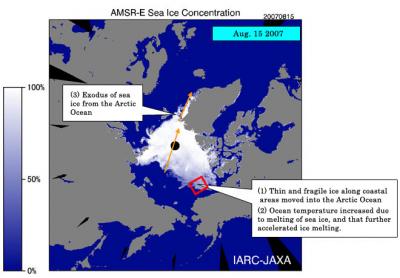
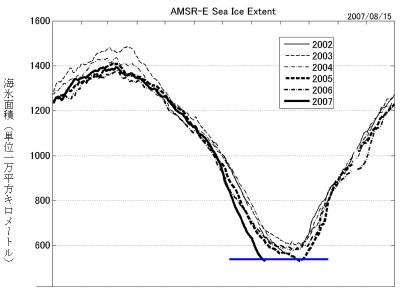
This is silly. The last picture is much smaller, making it appear there is less ice coverage. If you’re going to present scientific visualization data, at least make your diagrams the same scale. Exactly where did you go to school? :-)
Hi average: I can only assume you are trying to be funny, the last image of the ice is the same as the second to last image of the ice only it has annotation.
If you are not trying to be funny, that I can only point out that you should read more carefully.
Ignore average guy. He’s just a troll, ignore him. He’s the reason the Earth will be destroyed.
Anyway, this is pretty shocking. Kudos for bringing it up.
I’ve been tracking this for years at http://www.globalboiling.com
They have a live polar ice radar display that updates everyday.
I’m with Average Guy on this one; the last image is smaller scale.
The geography of the land would not change, so, actually, a larger scale of the diminishing ice-pack would make it easier to see the receding borders.
Are you guys serious?
You think this picture and this picture are different scales? You do realize that this picture is really just this picture with annotations on it?
I am not sure how much more clear I can make this.
I would be interested in what you two think about the fact that the ice cap is melting at a record rate, and less interested in what you think about the size of the images.
Serious. On my screen the last image is a reduction, complete, of the preceding images.
As to what I think about the ice caps melting at a record rate, I am not surprised, since I have long suspected that human activity would alter the Earth’s environment.
I am grateful for the serious people studying the phenomenon, and hopeful that, actionable, knowledge expands at an even greater rate.
Ignore average guy. He’s just a troll, ignore him. He’s the reason the Earth will be destroyed.
Anyway, this is pretty shocking. Kudos for bringing it up
100 bucks there’s no definitive “ice cap” by 2020. plenum222@yahoo.com This is so sad.
— ——-
Question: Does anybody know when the minimum in the solar cycle is, and if it would have any effect on the warming trend?
l love dhis blog it is very nice
yes it is
I dont understand this?? why
1. Since July, the smallest record of sea ice area in the Arctic Ocean has been broken every day.
2. Since the beginning of August, the shrinkage of sea ice has been accelerated by a low pressure system generated and lingering off Siberia.
Anyway, this is pretty shocking. Kudos for bringing it up.
Update?
Is the polar ice cap gone now, or what?
Ignore average guy. He’s just a troll, ignore him. He’s the reason the Earth will be destroyed.
Anyway, this is pretty shocking. Kudos for bringing it up
..this is good idea
thanks
Thank you for this post..